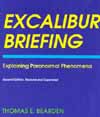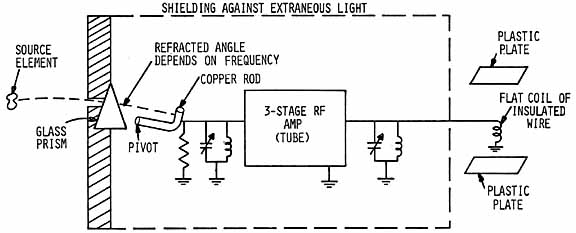TYPICAL HIERONYMUS DETECTOR
The Hieronymus device, patented by Thomas G. Hieronymus in 1949, is one such device. It has an optical front end, a prism which passes waves and does not admit
particles. So a wave entering the front end will go through the prism and be refracted at an angle that depends on the frequency of the wave. Inside the surrounding box, which acts as a light shield, is a small tuner, a little copper rod attached to a rotatable wheel so that the rod may be moved through the various refractive angles from the prism. The prism is mounted on the box with a thin slit in the wall, so that only a small and narrow field of view exists external to the box. The tuner rod is wired to the input of a three-stage RF amplifier where each stage is separately shielded against light-which is very
interesting, because of a similar requirement in the two-slit experimental apparatus if the
electron was to act as a wave. The output of the RF amplifier comes out of the box and ends in a flat coil of wire between two parallel plastic plates.
Coming into the box through
the slit in the prism, there can be single-state entities and dual-state
entities or quitons. The physicist does not have a good name for a
dual-state entity. They used to be called wavicles; today we talk
about wave packets. But what after all is a wave packet? It
is a three-dimensional bunch of two-dimensional waves! So that is
where the physicists have hidden the idea of the dual-state wavicle
today.
Only single-state waves and dual-state entities
or quitons can pass through the prism and be refracted at an angle
dependent upon the frequency. I f we then tune the rod into the
correct angle of refraction, the refracted quitons hit it, as do the
single-state waves if their frequency should happen to coincide with the
frequency of the quitons. Now the single-state wave dies when it
hits the copper rod; it may chip a single electron or two off a copper
crystalline grain, but that is lost in the thermal noise anyway, below
the detection threshold of the RF amplifier. The quitons, however,
simply say "Oh! Now you want us to act like a corpuscular electron,
and go through those wires and conduction paths. That's all right,
that is just our right hand side." So the quitons will go
through and be amplified, just exactly like ordinary electrons would do.
But now it is not electron energy, it is a dual-state analog of energy -
let us call it anenergy, for analog of energy. (Hieronymus called
it eloptic energy, since it could act as electron flow or as optical
waves, but was neither exclusively.) The amplified anenergy
will come out in the coil of wire and it will generate field and it is
not a magnetic field, and so it cannot be measured on normal laboratory
instruments. The simplest way to detect the anenergy fields is to
use the human sensory system, because the human body knew about RF
energy, frequency modulation, and anenergy long before we had modern
electrical and magnetic instruments. (The use of anenergy is
illustrated by acupuncture, a very ancient medical system dealing
with the fact that a peculiar type of energy-like stuff flows in the
body, and in certain points and structures of the body, it can interact
with other energies and fields.)
Now if we believe we cannot sense the anenergy
fields, then we cannot. We can turn the entire an energy detection
system in the body off with the unconscious mind. The negative psi
effect is a well-documented effect in parapsychology. There are
goats as well as sheep. Some persons do worse on psi tests than
chance would possibly allow. They are the goats. They
exhibit the negative psi effect, for unconsciously they want to show you
that psi does not work, so they use psi effects to do worse than is
possible by chance.
At any rate, the human sensory system can get a
tingle from the anenergy field generated by the flat coil of wire in the
Hieronymus machine's output. What type of tingle one gets depends
upon one's own type of body sensory tuning. It may feel as if the
fingers on the plastic plate are in thick syrup. Or as if the
plastic plate were vibrating. Or it may feel greasy in a peculiar
way. And the negative person does not get a tingle at all.
The Hieronymus machine has been built by many
persons, and it works for those who are not negative. It processes
entities that exist in the dual-state, or that obey the fourth law of
logic. And we can do some almost magical things with these
dual-state nonthings, these nothings, if we set our minds to it.
This is what psychotronics is all about.
Next Chapter |

